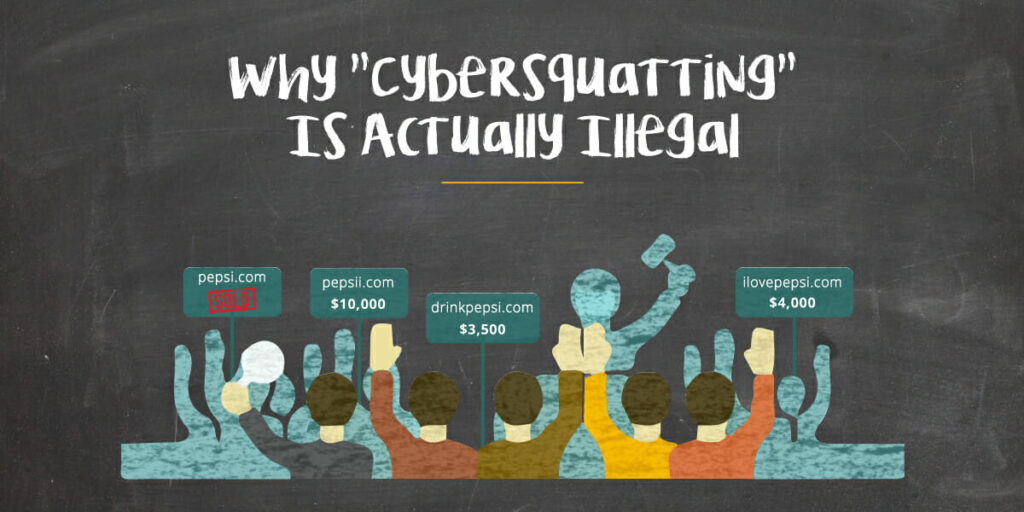Recently, there’s been a lot of talk about the do’s and don’ts of a website’s domain name. Some of the most common talk sounds like, “How many characters long they should be? Which keywords they should contain? Is it really worth X amount of money to buy this domain?” These are questions that we get on the day to day, and they’re definitely important things to be thinking. But, to avoid these from being unanswered questions…a domain should typically be around 12-13 characters, having at least one keyword in the domain is a plus, and if it’s in your budget, buy it.
In this post we want to talk about something a little bit different – something with legal repercussions. That’s right, we’re going to unpack the “Anticybersquatting Consumer Protection Act” also known as the ACPA. We’ll explain everything you need to know about the act, from why it exists, to how you can avoid being caught in the act.
First Off, What Is Cybersquatting?
You’ve likely heard the term before, but let’s do a quick refresh in case you’ve forgotten what the outlandish word means. Essentially, Cybersquatting is when a person acquires a domain name that contains another company’s mark to then sell or use for their own benefit.
To put this into perspective, let’s say you recently bought the domain Pepsii.com. You may hang this domain over the well-known soda brands head and convince them they need to buy it from you, or they may reach out to you and offer to buy it on their own. Fun fact, this is also referred to as “Typosquatting” – a lot of squatting, I know. Another example of cybersquatting is using another brand’s likeness in a confusing or misleading way. Some examples of this instance might include “mycoca-cola.com” or “drinkcoke.org”. While it’s not necessarily a misspelling of the brand name, it is misleading.
When Does Cybersquatting Cause The Most Harm?
While the above scenario is a bit more commonplace, there’s another tactic that causes more harm to a company. Let’s say that you’re a soda company that sells a beverage very similar to Pepsi. You’ve purchased the domain name “Pepsii.com” in hopes that people will attempt to go to their site and occasionally misspell the domain (adding on the second “i”) and then land on your website. The idea is that people will then purchase your product because it’s similar to what they were looking for in the first place.
You’re probably wondering how often people actually misspell the domain name? Quite often, and if the domain is in the likes of a massive brand, the amount of searches, and eventually misspellings is going to be much higher. With enough time, people will accidentally add that extra letter to your url, get redirected to a competitor’s site, and buy product Y even if they meant to buy product X.
Quick Case Study
How do we know this? Because we’ve seen it in person. Most recently, there was a scenario where a company was directing a huge chunk of traffic to their site, because they owned a domain that was just one letter different than their competitor’s brand name. A lot of people were making the misspelling, being redirected to the unintended site, and becoming customers. This can’t be right? Making money off of someone else’s brand name?
The company whose brand name was being used unjustly got fed up with hearing about how many people misspell their url and land their competitor’s site. After taking to the internet for some research, the company discovered that something could be done about this. They got their legal team involved and sent a piece of mail out to the competitor, who then surrounded the domain to them without any resistance.
Alas, The Anticybersquatting Consumer Protection Act (ACPA)
Passed all the way back in 1999, the ACPA is a U.S. law that “established a cause of action for registering, trafficking in, or using a domain name confusingly similar to, or dilutive of, a trademark or personal name.” What a great law, right? There’s a lot of websites out there, and a decent chunk of those have people cybersquatting on related domains. We want to help spread the awareness of the ACPA and encourage you to seek out any domain names that are similar to yours. Will you win the case? If you meet all the right criteria, yes.
The ACPA lets trademark owners sue alleged cybersquatters in federal court. If you win, you can obtain a court order that forces the cybersquatter to transfer the domain name over to you, along with monetary damages. In fact, a while back, The NFL filed suit against the registrant of a domain called “NFLtoday.com”. Also, Harvard filed suit against the registrants of several domain names that used the Harvard trademark including the domain “Harvard-lawschool.com”. Both cases were won.
To Bring Action to the ACPA, the Following Criteria Must Be Met:
- The mark must have been distinctive. If the claim is that the domain name dilutes the mark, then the mark must have been famous at the time that the domain name was registered.
- The plaintiff must also provide evidence that the “squatter” acted with bad faith intent to profit.
What Qualifies as “Bad Faith Intent”?
- (B)(i) In determining whether a person has a bad faith intent described under subparagraph (a), a court may consider factors such as, but not limited to
- (I) the trademark or other intellectual property rights of the person, if any, in the domain name;
- (II) the extent to which the domain name consists of the legal name of the person or a name that is otherwise commonly used to identify that person;
- (III) the person’s prior use, if any, of the domain name in connection with the bona fide offering of any goods or services;
- (IV) the person’s bona fide noncommercial or fair use of the mark in a site accessible under the domain name;
- (V) the person’s intent to divert consumers from the mark owner’s online location to a site accessible under the domain name that could harm the goodwill represented by the mark, either for commercial gain or with the intent to tarnish or disparage the mark, by creating a likelihood of confusion as to the source, sponsorship, affiliation, or endorsement of the site;
- (VI) the person’s offer to transfer, sell, or otherwise assign the domain name to the mark owner or any third party for financial gain without having used, or having an intent to use, the domain name in the bona fide offering of any goods or services, or the person’s prior conduct indicating a pattern of such conduct;
- (VII) the person’s provision of material and misleading false contact information when applying for the registration of the domain name, the person’s intentional failure to maintain accurate contact information, or the person’s prior conduct indicating a pattern of such conduct;
- (VIII) the person’s registration or acquisition of multiple domain names which the person knows are identical or confusingly similar to marks of others that are distinctive at the time of registration of such domain names, or dilutive of famous marks of others that are famous at the time of registration of such domain names, without regard to the goods or services of the parties; and
- (IX) the extent to which the mark incorporated in the person’s domain name registration is or is not distinctive and famous within the meaning of subsection (c) of this section.
What Does All of This Mean For You?
With websites launching like never before, it’s hard to keep track of who’s doing what and whether there’s an opportunity for your company to jump on. With the flux of clients coming to us with concerns about their domain names, it seemed appropriate to shed some light on the ACPA and everything the act entails. We want to encourage you to ask questions: Is there something a competitor is doing that rubs you the wrong way? Is that website audit you just got in your email inbox legit? If you have a nudge that something isn’t right, look online for other companies that have been in your shoes and stay educated on the legality of the web.
Reach out to us if you need a team to field your trickiest questions and help advise you on the best practices in digital.








